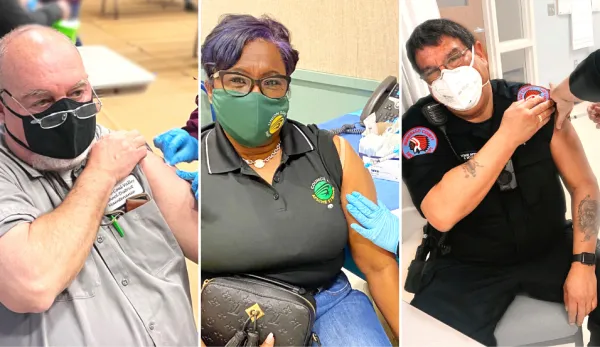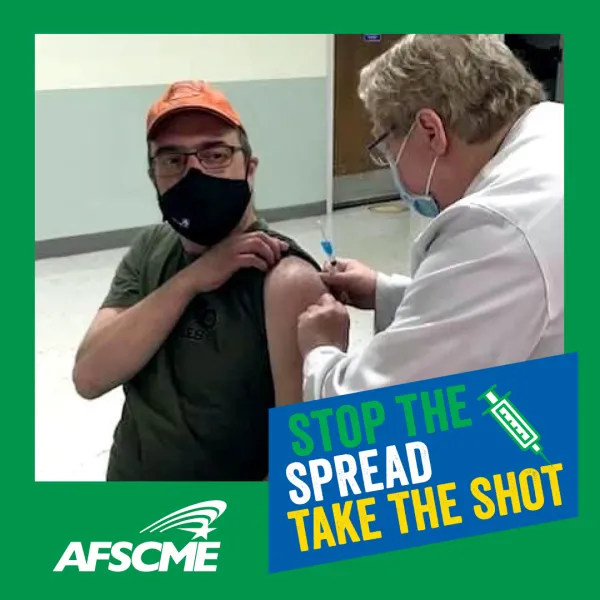The path forward: COVID-19 vaccines

VACCINE LOCATIONS
Many AFSCME members will have the chance to be vaccinated at work. For more information on COVID-19 vaccine eligibility, go to https://coronavirus.illinois.gov/s/vaccination-plan-overview. To find a COVID-19 vaccine provider near you, visit the coronavirus.illinois.gov website for vaccination locations. Individuals who do not have access to online services or need assistance navigating online services to make an appointment can call the Vaccine Appointment Call Center at 833-621-1284.
VIDEOS
At 95% efficacy, the COVID-19 vaccines are extraordinarily effective at protecting you from the virus. They were approved after a rigorous, transparent research process conducted by medical experts. Even so, some people remain skeptical or concerned. That’s normal, and AFSCME wants to help answer any questions you may have.
"AFSCME stands as one. Let’s vaccinate as one."
Randy Hellmann—a longtime Illinois AFSCME local union president, Council 31 executive board member and staff representative—died of COVID-19. His final wish was that his fellow union members get vaccinated. WATCH.
Get Vaccinated, Do Fun Things!
The COVID-19 vaccines are safe and effective—join in the fun of getting back to normal. WATCH.
AFSCME Council 31 Forum
Your Questions Answered—Click here to read an in-depth fact sheet with responses to questions submitted by AFSCME members during our Feb. 4 virtual forum and Q&A with AFSCME staff and union members about the COVID vaccines. WATCH.
FAQ with Dr. Landon
In a virtual town hall meeting presented in mid-January by the Illinois Department of Human Services, Dr. Emily Landon - an infectious disease specialist at the University of Chicago - answered many of the most commonly asked questions about the COVID-19 vaccines. Click here to watch.
FACT SHEETS
You can click to download a one-page fact sheet and a two-page fact sheet.

FACT: Getting vaccinated can prevent severe illness from COVID-19.
The individual impact of COVID-19 varies, from mild symptoms to severe illness and death. There is no way to know how COVID-19 will affect you, even if you do not have underlying health conditions that put you at increased risk of severe complications. The Pfizer, Moderna and Johnson & Johnson vaccines are a safe and highly effective way to protect yourself from COVID.
FACT: You cannot get COVID-19 from the vaccine.
None of the authorized or approved vaccines contain the live virus that causes COVID-19. The Moderna and Pfizer vaccines contain mRNA which works with the body’s natural defenses to safely develop an immune response to the disease. The Johnson & Johnson uses a harmless adenovirus (common virus that typically causes cold or flu-symptoms) that triggers an immune response. When vaccinated, you will not test positive on viral tests, which are used to see if you have a current infection.
FACT: The currently available vaccines have proven to be safe.
Each of the vaccines were studied in large trials of over 30,000 volunteers to make sure they meet safety and efficacy standards and protect adults of different ages, races and ethnicities. These clinical trials were conducted according to rigorous standards set forth by the FDA. Even though no safety issues arose, the CDC and FDA continue to monitor the vaccines for serious side effects. Monitoring vaccine safety is critical to ensuring the benefits of the COVID-19 vaccines continue to outweigh the risks associated with contracting the virus. On August 23rd the FDA granted full approval the Pfizer vaccine, meaning it has met the FDA’s rigorous, scientific standards for safety, effectiveness and quality.
KEY QUESTIONS ANSWERED:
How were the vaccines developed so quickly and what is an Emergency Use Authorization (EAU)?
An EAU is a process by which the FDA can provide access to medical products, including a vaccine, in response to a public health emergency. For an EAU to be issued for a vaccine, the FDA must determine that the known and potential benefits outweigh the known risks of the vaccine.
In evaluating the EAU requests for the COVID-19 vaccines, the FDA evaluated the relevant statutory criteria and the scientific evidence available. The clinical trials generated the data and information used by the FDA to determine safety and effectiveness. Manufacturing and controls to ensure the quality and consistency of the vaccine product are also considered as part of the EAU.
The approved COVID-19 vaccines were subjected to a 3-phase clinical trial conducted according to the rigorous standards set forth by the FDA involving tens of thousands of study participants. The vaccines could be developed quickly because the US government, international counterparts, nonprofit organizations, academia and pharmaceutical companies developed a coordinated strategy for prioritizing and speeding the development of the most promising vaccines. Improvements in technology supported these efforts. In addition, the federal government made investments in manufacturing which allowed for faster distribution of the vaccine. No scientific standards were sacrificed in the development of the approved COVID-19 vaccines.
Is vaccination right for everyone?
Everyone 12 years of age and older is eligible to get a COVID vaccination. The vaccine is appropriate, indeed essential, for nearly every eligible individual.
The exceptions are as follows:
- You should delay vaccination if you’ve been diagnosed with COVID within the past 14 days or have a fever or other illness. In addition, CDC recommends the COVID vaccine be separated from other vaccines, like the flu shot, by 14 days.
- Individuals who have a history of severe allergic reactions should consult CDC guidance and their medical provider before vaccination, as there are rare reports of severe allergic reaction to the vaccine.
Do I still need the vaccine if I’ve already had COVID-19 and recovered?
Yes, the CDC recommends that you get vaccinated even if you have already had COVID-19. While you have some natural immunity after recovering from COVID-19, it is not known how long this protection will last. So the vaccine can help protect you after that.
What has been the experience of others who have already received the COVID vaccine?
As of September 9, 2021, over 208 million people in the United States have received at least one dose of vaccine (that’s 63% of the population). Of that entire number, adverse effects and severe allergic reactions have been rare. All were treatable and none were comparable to the often severe consequences of COVID-19.
What are the most common COVID-19 vaccine side effects?
The COVID-19 vaccine may cause side effects, but they should go away within a few days. This does not mean you have COVID-19, but rather that the vaccine is working to build immunity. Reported side effects include pain at the injection site, fever, headache, muscle aches and pains.
How many doses of the vaccine are needed?
Moderna and Pfizer are a two-dose vaccine and both doses are needed within the required timeframe for the vaccine to be most effective. The first shot allows the immune system to recognize the virus and the second shot strengthens the immune response. The Johnson & Johnson vaccine requires a single dose to prevent severe illness, hospitalization and death. You are considered fully vaccinated 2 weeks after your second shot of Moderna or Pfizer, or 2 weeks after your Johnson & Johnson shot.
Can I still spread the virus after I am vaccinated?
COVID vaccines protect people from getting infected and severely ill, and significantly reduce the likelihood of hospitalization and death. While effective at preventing most infections, the vaccines are not 100%- especially as new variants arise- and breakthrough infections in which individuals are contagious are occurring. Fully vaccinated people with a breakthrough infection are less likely to develop severe illness compared to those who are unvaccinated. The best way to slow the spread of COVID and to prevent infection is to get vaccinated.
